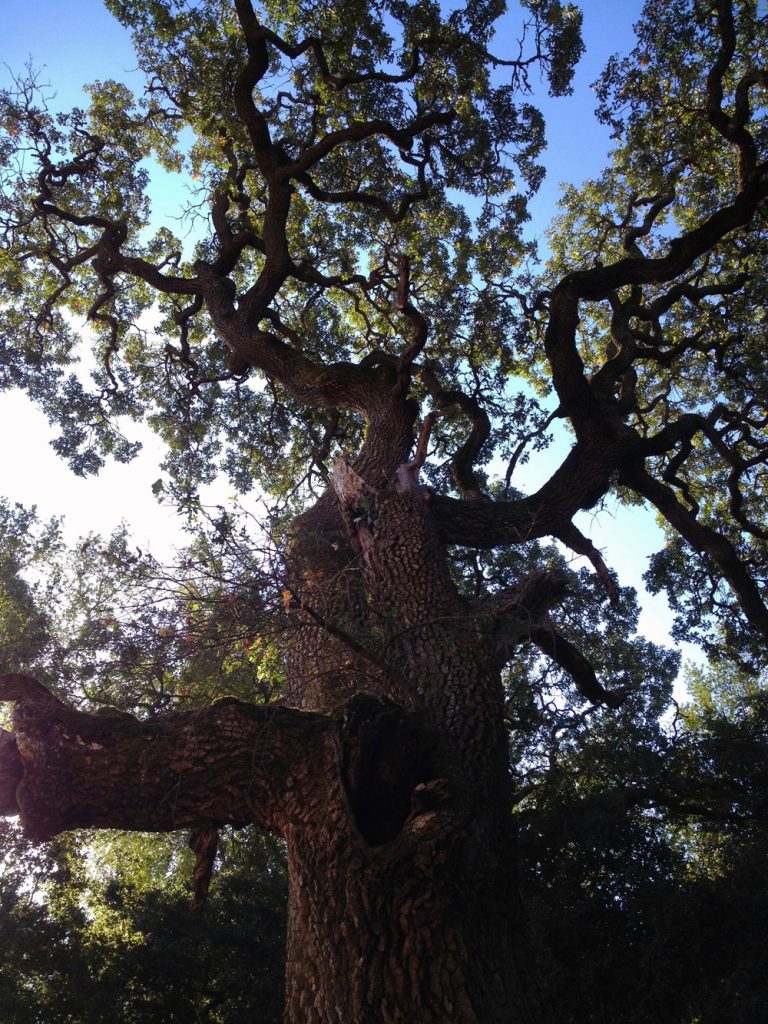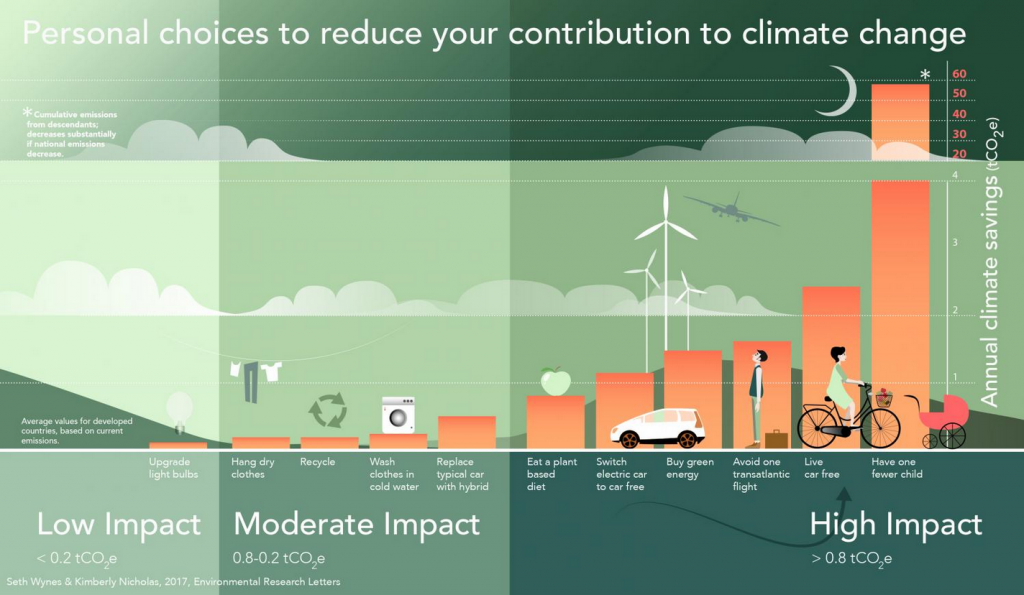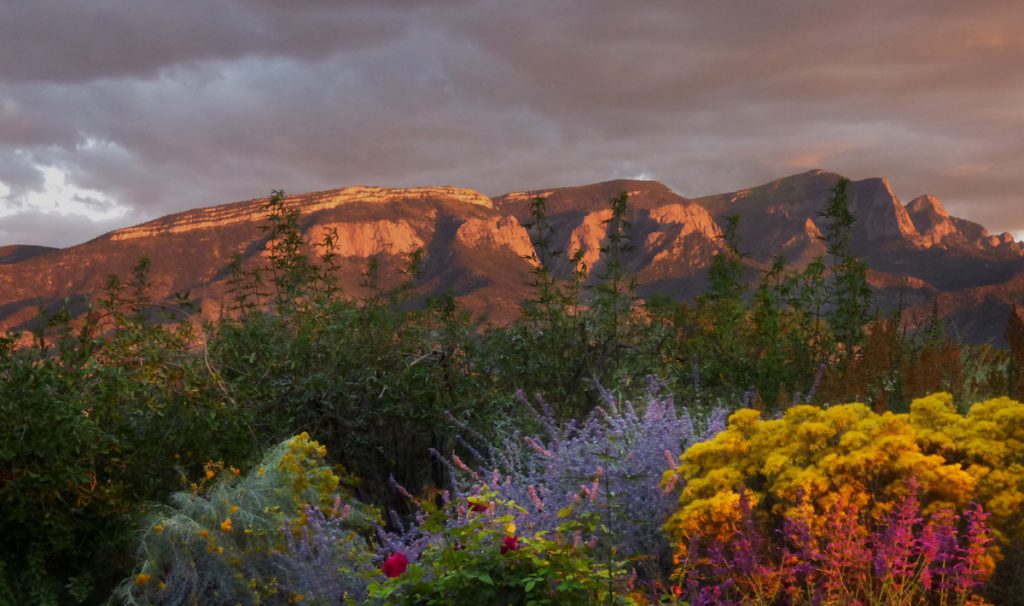Supercharged hurricanes in the Southeast and millions of acres ablaze in the West—all amplified, we now know, because of climate change. Yet most of us feel powerless in the face of an issue so overwhelming. When it comes to climate change, what can one person do, anyway?
A lot! Individuals do have power. It just doesn’t get talked about very much.
Some actions, such as reducing our carbon footprint, are no-brainers, and we’ll get to those in a minute. But let’s start somewhere else—with actions that can give you the juice for making changes in the first place. If you want to feel your own power, start here.
Get outside
 Get outside. Keep your connection with nature strong. To feel your own power again, simply go for a walk.
Get outside. Keep your connection with nature strong. To feel your own power again, simply go for a walk.
When we get outside, we rub shoulders with countless other lives, other ways of being alive—whether a downy woodpecker on a cottonwood in a city park or the roots of trees snaking through concrete. Life in all its forms is pushing up through the cracks.
All these other beings have been solving creative problems far longer than we have. Getting outside reminds us that we are in good company—with all the species who together shaped the four-billion-year-old experiment of life on Earth before humans appeared.
Get in touch with your senses
To feel your own ability to affect the world around you, get in touch with your senses. Pay attention to what you see, what you hear, what you sense and feel and taste. You will be seating yourself firmly in your own body instead of getting lost in your mind with its worries and fears for the future.
Take a time-out periodically throughout the day just to breathe deeply. Enjoy the feeling of your lungs expanding, your heart pumping.
 Notice the colors of each day—different from season to season. Listen to the voices of your more-than-human neighbors—sounds of birds and animals, the whoosh of breezes or the crinkle of leaves underfoot. Trace the bark of a tree with your fingertips. Enjoy the changing palette of flowers. Eat mindfully, paying special attention to the taste of each bite.
Notice the colors of each day—different from season to season. Listen to the voices of your more-than-human neighbors—sounds of birds and animals, the whoosh of breezes or the crinkle of leaves underfoot. Trace the bark of a tree with your fingertips. Enjoy the changing palette of flowers. Eat mindfully, paying special attention to the taste of each bite.
Inhabiting your body fully gives you a stronger foundation for perceiving the world accurately.
Sit with a tree
 Sit for a few minutes next to a tree. Look, really look, at it. Absorb the lines of its branches, feel the quality of the air near it. Choose one question to ponder—maybe one of your big questions. In the presence of a tree, you might be surprised what creative solutions arise.
Sit for a few minutes next to a tree. Look, really look, at it. Absorb the lines of its branches, feel the quality of the air near it. Choose one question to ponder—maybe one of your big questions. In the presence of a tree, you might be surprised what creative solutions arise.
Live from the heart
Being in nature has many health benefits, as the ever-growing list of scientific studies shows. But many of those benefits, such as lifting people’s spirits or increasing their energy, add up to something simple: Nature helps people live from the heart.
What does it mean to live from the heart? It means being a good citizen of the planet—remembering that every other being on Earth is equally worthy of respect. It acting in reciprocity, giving back when we take.
It means making decisions differently—not what will benefit me in a narrow sense but what will benefit the renewing of life on Earth. Not how to get ahead but how to contribute to nature’s bounty. The truth is that we’re all related, and what affects one individual or species or watershed or region is going to affect every other person and place on Earth. Live with awareness of our interdependence. Live from the heart.
Build community
If the human race is to survive a heated Earth, it will be by supporting one another and building resilience. Contribute to resilience by strengthening your local community. You might work with people, you might work with animals, with attitudes, with economies. Every bit of support and resilience will help—and will address climate change because it gives people a foundation for making better decisions.
Work to end the use of oil, gas, and coal
Okay, now we get to the no-brainers—the direct actions individuals can take. First is reducing the size of your own carbon footprint. Earlier this year, the group Environmental Research Letters quantified individual actions, and here’s what they found.

Changing light bulbs may have little impact, but biking instead of driving makes a big difference. Actions in the high-impact range in fact can make more difference than some organized group efforts, such as community recycling.
And the biggest difference of all, if you live in an industrialized Western country—far outpacing all other actions—is to have a smaller family. This is because each baby born in an industrialized country, over the course of their lifetime, will develop such a large carbon footprint. Another surprising fact: avoiding one transatlantic flight—only one!—makes a larger difference than buying green energy.
 Other direct actions
Other direct actions
And then there are the actions that are not even addressed in this study, such as eating organic and stopping the use of chemical pesticides in your yard. You can reduce climate change by helping to encourage your friends and neighbors to make these and similar choices.
Cut down your use of plastic, and work to end the use of plastic altogether—in your office, your business, your industry. Wear natural fibers, not synthetic or microfibers, which are derived from petroleum and contribute to plastic pollution in the oceans.
Follow ESG (environmental, social, governance) standards in your retirement fund, or pressure public institutions such as your town or city or university to divest from oil and gas. Work to end the $5 trillion directed to oil, gas, and coal subsidies every year around the world. Because oil and gas money represents a significant percentage of total campaign contributions, work to get oil and gas money out of elections. In countless ways, petroleum infiltrates modern life, so the actions you can take to end its use are likewise limitless.
Ask audacious questions
 Then there is all the work of the imagination to be done in order to conceive of a world beyond oil, gas, and coal. Anyone can do this work! How? Ask audacious questions. Think outrageous thoughts. Imagine different rules.
Then there is all the work of the imagination to be done in order to conceive of a world beyond oil, gas, and coal. Anyone can do this work! How? Ask audacious questions. Think outrageous thoughts. Imagine different rules.
For instance, much of climate change is driven by rules of commerce that reward accumulation and profit rather than reciprocity. What might it look like to change those rules? What if, for instance, all corporations were benefit corporations, required by law to demonstrate each year some public benefit? Or, more radical, what if they all had to be nonprofit, providing a decent living for those involved and required by law to distribute any remaining profit to others?
What if companies within the same watershed shared profits, like a modern-day version of the potlatch? Or what if local communities passed community rights ordinances to claim their legal power to stop corporate damage to the environment in their local areas? How could humans ensure the rights of nature in addition to our own? Or encourage human responsibility to care for the more-than-human world?

Inequality is one driver of climate change, so working toward economic equality in any way will help to mitigate climate change. Inheritance preserves inequality, so what if there were no inheritance, so that when a person died, their assets passed into a community fund or a national healthcare fund or even to a worldwide climate mitigation and reparations fund?
Imagine different rules
We humans made the current laws, and we can unmake them too. We can imagine different rules that promote a more just world where people live in creative balance with the rest of life on Earth. Because if we don’t, the human experiment will not last long.
Creativity is waiting to happen—within every person, every community.
What can one person do about climate change? Turns out, a lot!
But it all starts with getting outside.

















Thank you Priscilla. I appreciate your thoughtful insights that engage as they encourage. It’s easy to think there’s nothing to be done and that it’s too late and here you remind me and hopefully others to think again and again and again. it is a gift to read your thoughtful words and encouragements.
Hi, Kate, I’m glad you picked up on the encouragement! Yes, most of our inability to act, I think, is despair and overwhelm. The future hasn’t happened yet, so the best way to meet it is to act today as if our daily choices matter. Which they always do. Here’s to moving forward with hope.
thanks, Priscilla, for these inspirational ideas. I especially love the idea of a benefit corporation. Just imagine if we based our society on the ideals of compassion and sharing.
Yes, let’s imagine! It’s the first step to bringing something new to pass. If it’s not possible in our imaginations, it can never come to be. So yes, let’s imagine! And then imagine how to get there, step by step. . . .
Thanks much for this Priscilla!
You’re welcome, Michael! Best wishes in your upcoming changes and in loving a new landscape.